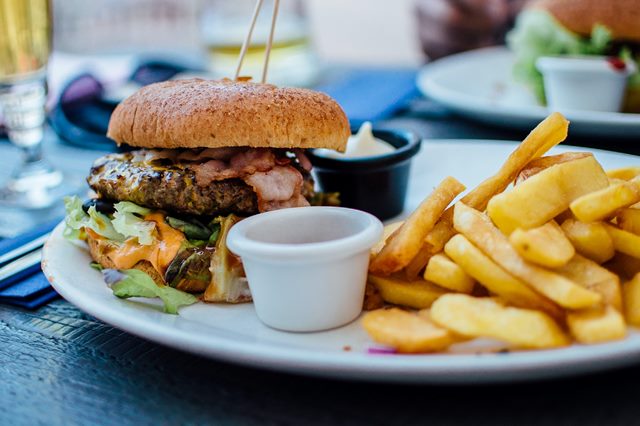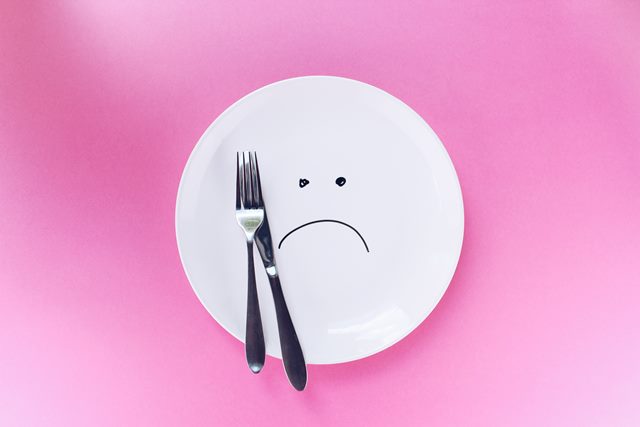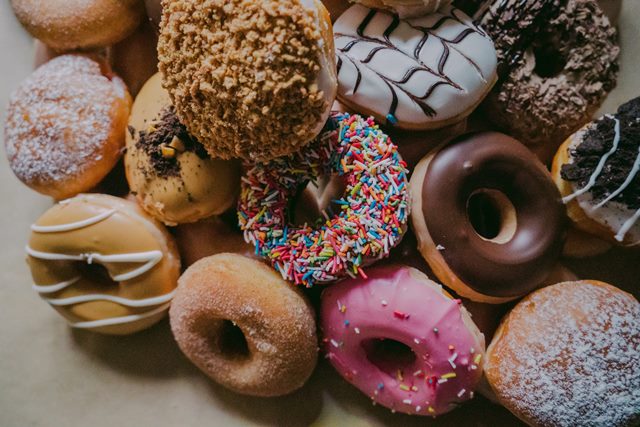Do you sometimes feel sluggish after every meal? After all, food is meant to give you strength. So, why do you feel sleepy and unproductive almost immediately after? Some people might even feel guilty after every meal. Others have trouble controlling their cravings and can’t maintain a healthy weight. This could all be due to your eating habits!
It’s time to examine how and what you’re eating closely to identify the bad eating habits you need to stop.
We can sabotage our diet and health in many ways without realizing it – from overeating or skipping meals to relying on “convenience foods” and ignoring our body’s signals.

The good news is that we can break these habits. And even adopt healthier and more sustainable eating habits with a little awareness and effort. Here, we’ll uncover the bad eating habits you should break based on guidelines from the Center for Disease Control and Prevention.
We will also cover the secrets to a happier, healthier lifestyle.
Skipping Meals
Many people develop the bad habit of skipping meals without realizing the negative effects it can have on their health. Skipping meals without a proper plan fasting plan is dangerous as it can cause a slew of health issues.
Read: Does Intermittent Fasting Work?
One of the consequences of skipping meals is that it can lead to compulsive overeating later in the day. Every time you skip a meal, your metabolism slows. This can cause you to feel hungrier than usual, causing you to overeat at your next meal.

In addition, skipping meals can cause a drop in blood sugar levels, leading to fatigue and irritability. Another disadvantage of skipping meals is that it can lead to nutrient deficiencies. When you skip a meal, your body may not get the proper nutrients it requires. This can result in various health issues, including anemia, a weakened immune system, and brittle bones.
Skipping meals can also lead to weight gain. When you skip a meal, your body may start to crave high-calorie, sugary foods to make up for the lack of nutrients and energy it is receiving. This can lead to unhealthy snacking and, ultimately, weight gain.
Read: Hidden Dangers: What to Avoid in Processed Foods
How to Avoid Skipping Meals
So, how do you get out of the habit of skipping meals?
One of the most effective methods is to plan ahead of time and incorporate regular meal times into your daily routine. To help regulate your body’s hunger and metabolism, try to eat at the same time every day.
Eating nutritious, well-balanced meals that provide your body with the energy and nutrients it requires is also important.

It could be a good idea to always keep healthy snacks, like fruits, on hand in case you find yourself in a situation where you need to skip a meal. You can also try eating smaller, more frequent meals throughout the day to keep your metabolism going and avoid hunger and cravings.
Read: 6 Fruits That Aid Digestion
We Design & Develop Websites, Android & iOS Apps
Looking to transform your digital presence? We specialize in creating stunning websites and powerful mobile apps for Android and iOS. Let us bring your vision to life with innovative, tailored solutions!
Get Started TodayOvereating Is an Eating Habit You Should Stop
Overeating is a common bad habit that many people suffer from, often without realizing the negative consequences for their health. It can result in weight gain, a higher risk of chronic diseases, and various other health issues.
One of the main negative effects of overeating is weight gain. Consuming more calories than your body needs can accumulate body fat, which can increase your risk of obesity and related health problems such as diabetes and heart disease.

You can read more about what calorie deficit is and how it affects weight gain.
Overeating can also put a strain on your digestion, leading to acid reflux and other gut-related issues. There is also the risk of affecting your mental health. Some people have reported feelings of guilt, shame, and low self-esteem which have been connected to emotional or stress eating.
Read: Is Intermittent Fasting Beneficial for You?
How do You Break Bad Habits Like Overeating?
Managing portion sizes is an excellent way to stop overeating.
Rather than eating until you feel full, try to eat until you feel satisfied. Use smaller plates and bowls to help control portion sizes. And also, take your time to eat, savoring each bite and paying attention to your body’s hunger cues.

Another tip is to identify triggers for overeating. Many people overeat in response to certain emotions or situations. By identifying these triggers, you can work to avoid or manage them more healthily.
Read: How to Create a Balanced and Nutritious Meal Plan
Eating Large Quantities of Processed Food
Processed foods are foods that have been altered in some way, such as canned, frozen, or packaged. They frequently contain high levels of added sugar, salt, and unhealthy fats, which can harm your health.
Another disadvantage of a high-processed food diet is that it can lead to nutrient deficiencies. Processed foods are typically depleted of essential nutrients and vitamins, which can result in a variety of health issues such as anemia, a weakened immune system, and brittle bones — just like skipping meals.

Eating large quantities of processed food can also impact mental health. Many processed foods are high in sugar and refined carbohydrates, which can cause blood sugar fluctuations and lead to mood swings, fatigue, and irritability.
Read: The Best Self-Care Routines for Your Mental Health
Strategies to Reduce the Consumption of Processed Foods
One of the best ways is to incorporate more whole foods into your diet. Whole foods are foods that are minimally processed and contain all of their natural nutrients and vitamins. Examples of whole foods include fruits, vegetables, whole grains, and lean proteins.
We Design & Develop Websites, Android & iOS Apps
Looking to transform your digital presence? We specialize in creating stunning websites and powerful mobile apps for Android and iOS. Let us bring your vision to life with innovative, tailored solutions!
Get Started Today
In addition, you should read food labels and ingredient lists. You can identify processed foods and avoid them by looking at the ingredient list.
High Sugar Consumption
We know you’ve heard this a million times before. But we’re here to say it again – high sugar consumption isn’t good for you. It is one of the most dangerous eating habits. And you need to stop.
Consuming a diet high in sugar can contribute to weight gain, an increased risk of chronic diseases, and other health problems. One of the main negative effects of consuming a diet high in sugar is weight gain.

Sugar is high in calories, and consuming too much can lead to an accumulation of body fat. Additionally, sugar is often added to processed foods, making it difficult to control portion sizes and calorie intake.
Another negative effect of a high-sugar diet is that it increases the risk of chronic diseases such as diabetes and heart disease. High sugar consumption can cause blood sugar fluctuations, leading to insulin resistance, a risk factor for type 2 diabetes.
Read: 7 Warning Symptoms of Diabetes
Sugar consumption can also contribute to high blood pressure, high cholesterol, and other risk factors for heart disease.
Another negative effect of consuming a diet high in sugar is that it can cause nutrient deficiencies. When you consume large amounts of sugar, you may not get the essential nutrients your body needs to function properly. This can lead to various health problems, including anemia, a weak immune system, and brittle bones.
How to Cut Sugar Intake
This is quite straightforward for many people because we know the foods that contain high sugar levels.

One of the best ways is to reduce your sugar intake by reading food labels and ingredient lists. Choose foods with less added sugar and opt for natural sweeteners such as honey, maple syrup, and fruits.
Another suggestion is to look for healthier alternatives to sugary foods. Instead of a candy bar, for example, try a fruit or a handful of berries. Instead of a soda, drink water.
Eating When You Are Not Hungry
Eating when you are not hungry can be a sign of mental health issues. Many people eat when they are not hungry to cope with emotions such as stress, boredom, or even depression.
It is important to start paying close attention if you notice you are beginning to eat way too much, especially when you are not hungry.

Like overeating, one of the best ways is to identify triggers for emotional eating. This is because many people eat when they are not hungry in response to certain emotions or situations. By identifying these triggers, you can work to avoid or manage them more healthily.
Read: How Does Sugar Consumption Affect Your Health?
Eating Late at Night
Eating late at night is one of the commonest eating habits. Virtually everyone is guilty. But you need to stop this.
We Design & Develop Websites, Android & iOS Apps
Looking to transform your digital presence? We specialize in creating stunning websites and powerful mobile apps for Android and iOS. Let us bring your vision to life with innovative, tailored solutions!
Get Started TodayA negative effect of eating late at night is that it can disrupt the body’s natural sleep-wake cycle. When you eat late at night, your body must work harder to digest the food, making it harder to fall asleep and stay asleep.
Eating late at night can also lead to acid reflux and other gut-related issues that can interfere with sleep.
That’s not all.

Eating late at night can also result in weight gain. Consuming more calories than your body requires, especially at night when your body is less active, can increase body fat. Thus, increasing your risk of obesity and related health problems such as diabetes and heart disease.
You may also suffer from nutrient deficiencies when you eat late at night. This is because your body may not be able to properly absorb the nutrients from the food consumed late at night.
One of the best ways to control this habit is to schedule regular meal times into your daily routine. Try to eat your last meal at least 3 hours before bedtime. This will give your body enough time to digest the food before going to bed.
Another tip is to find healthy alternatives to nighttime snacking. Instead of reaching for high-calorie, sugary foods, try fruits, a handful of berries, or a glass of low-fat milk.
That’s it! While everyone’s body is different and genetics play a part, these tips on the eating habits you should stop will save you from health problems.
Before you go…
Hey, thank you for reading this blog to the end. I hope it was helpful. Let me tell you a little bit about Nicholas Idoko Technologies. We help businesses and companies build an online presence by developing web, mobile, desktop, and blockchain applications.
We also help aspiring software developers and programmers learn the skills they need to have a successful career. Take your first step to becoming a programming boss by joining our Learn To Code academy today!
Be sure to contact us if you need more information or have any questions! We are readily available.
Put Your Tech Company on the Map!
Get featured on Nicholas Idoko’s Blog for just $200. Showcase your business, boost credibility, and reach a growing audience eager for tech solutions.
Publish Now










